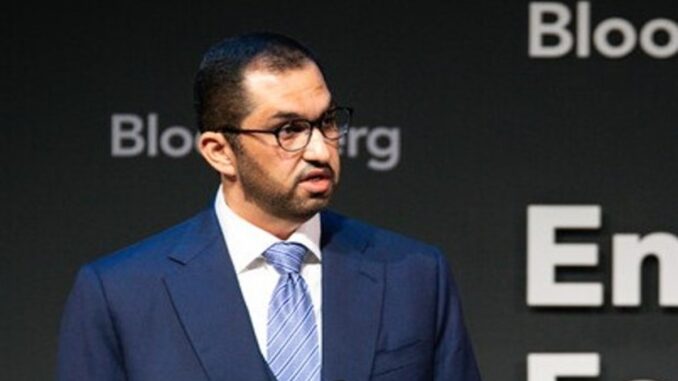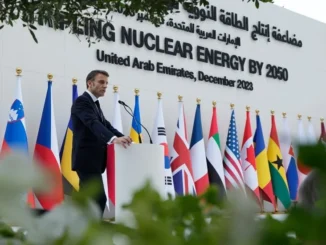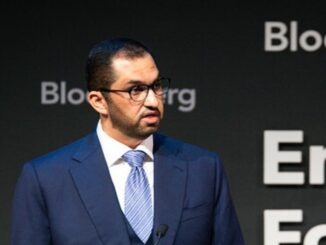
In the months before the signing of the Paris Agreement, the then-crown prince of oil-rich Abu Dhabi wondered aloud about the fate of his sheikhdom at the end of the fossil fuel era. “After we have loaded this last barrel of oil, are we going to feel sad?” Sheikh Mohammed bin Zayed Al Nahyan asked attendees at the 2015 Government Summit in the United Arab Emirates. “If our investment today is right, I think—dear brothers and sisters—we will celebrate that moment.”Soon the sheikh handed the job of running the Abu Dhabi National Oil Co., the world’s 12th-largest producer of oil and gas, to an Emirati renewables executive named Sultan Al Jaber. The move seemed to signal a shift in a country sitting atop about $9 trillion in untapped oil. The extraordinary wealth generated by Adnoc has filled a sparsely populated desert with gleaming cityscapes, lush golf courses and giant airports over just a few decades. It was to be entrusted to someone who’d spent much of his career making investments in renewable energy and trying without success to build a zero-carbon city in the desert. The mission: Figuring out how to sell energy indefinitely, even if that means doing so—at some point—without planet-warming emissions.
Now Al Jaber has been picked again to solve a similarly vexing puzzle. The Adnoc chief is organizing COP28, the crucial United Nations climate summit, which will bring heads of state, diplomats, activists and business leaders from each of the world’s nearly 200 nations to Dubai at the end of November. It will fall to him to guide hostile factions to consensus.
That means the job of fixing the climate has been given to an actual fixer, with the power of the host country’s autocratic ruler behind him. But it’s a gamble. The person with the most influence over global warming this year is also the boss of one of the world’s biggest polluters—imagine Exxon and BP combined—who is controlling and thin-skinned to media criticism.
In an hour-long interview with Bloomberg Green, one of the few he’s granted since assuming leadership of COP28, Al Jaber laid out his view that there’s no contradiction in an oil executive running a pivotal climate forum. He says his role as the public face of clean energy from the UAE has often made him misunderstood. “I can tell you that in most of the meetings people used to react in a different way,” he says, looking back on his early days at state-owned renewables company Masdar. “Some would get very excited, and some were puzzled: ‘You’re a major oil-producing nation.’ ”
Green groups are indeed angry that an executive overseeing the expansion of Adnoc’s production capacity—and, as a result, an increase in its already massive emissions—is also organizing the process by which countries are pledged to rapidly curtail greenhouse gases. More than 400 climate and environmental groups sent a letter to the UN secretary general saying that Al Jaber’s work “threatens the legitimacy and efficacy” of the summit. More than two dozen US lawmakers petitioned for diplomatic pressure to force him out.
Critics fear the oil business will be enmeshed in the climate summit, and there are indications this is already happening: Some consultants and staff working on COP28 are being paid by Adnoc, according to people who didn’t want to be named speaking without permission. (Representatives for Al Jaber said in a statement that the budget for COP28 comes from the UAE government and “strict rules of governance” ensure separation from the state oil company.)
Even a longtime COPgoer such as Sandrine Dixson-Declève, co-president of the Club of Rome, is telling colleagues to consider staying away. “It’s really incredible how far and wide it’s gone, including some very senior people,” she says of her concern over the reach of Adnoc’s money.
The backlash has frustrated Al Jaber, according to interviews with more than four dozen of his colleagues and associates, many of whom asked not to be named. He expected his years of working on sustainability to earn an embrace from the COP community.
And some leaders did, including important diplomats. The Maldives, an island nation vulnerable to even small increases in sea levels, endorsed Al Jaber. So did European Union climate chief Frans Timmermans, an emissions-cutting hawk who nearly stormed out of last year’s COP27 to protest the failure to reach a stronger agreement on curbing fossil fuels. US climate envoy John Kerry suggested that what critics derided as a conflict of interest—a diplomat who’s also a businessman—would actually help solutions “move faster and at scale.”
(Michael R. Bloomberg, the founder and majority owner of Bloomberg LP, parent company of Bloomberg News, is the UN secretary general’s special envoy for climate ambition and solutions. Bloomberg Philanthropies regularly partners with the COP presidency to promote climate action.)
Something Al Jaber and his critics awkwardly agree on: We need a fix, right now. Eight years out from Paris, the UN process is considered crucial even though it hasn’t achieved rapid progress. Greenhouse gas emissions hit record levels again in 2022, boosted by an energy crunch and rising demand for coal that followed Russia’s invasion of Ukraine. The upcoming summit will also be shaped by the latest UN climate report, published in March, which calls for immediate reduction in emissions. “We were dealing with different circumstances,” Al Jaber says of the era that produced the breakthrough moment in Paris. “The purpose of everything we’ve been doing in the previous COPs has changed.”
A key architect of Paris counts herself among those calling for change: “COP summits can’t continue with business as usual,” says Laurence Tubiana, chief executive officer of the European Climate Foundation. In a letter to the UN, Tubiana, Dixson-Declève and other high-level experts have laid out ways to reform the process, including shrinking the number of attendees and creating concrete plans to eliminate fossil fuels.
Al Jaber, 49, wants “transformational progress.” Even if reforming the COP process doesn’t appear on the agenda, there’s still a chance for a breakthrough at COP28 by getting a key phrase into the final communiqué: Phase out oil and gas. Last year’s summit, hosted by Egypt, ended with fossil-friendly nations making rearguard actions to strike out such language. The UAE’s environment minister, Mariam Almheiri, has already tested a pitch to “phase out oil and gas in a just way” in a recent talk at a diplomatic gathering in Germany.



